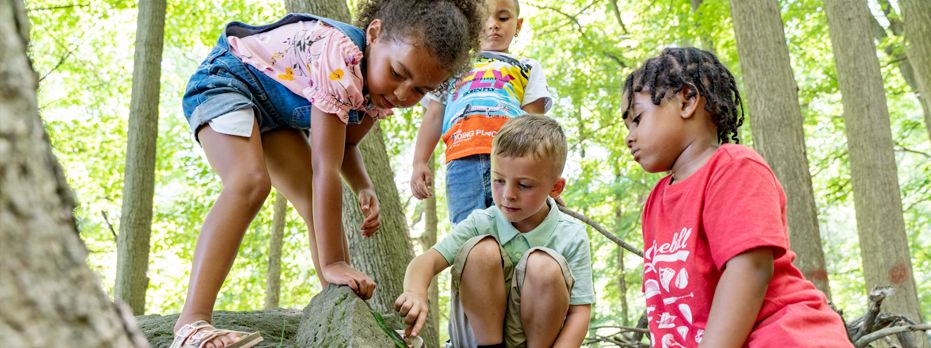When I think back to my elementary school years, there is always that one experience that comes to mind first, that I carry with me, that I will never forget. Nature's Classroom. My elementary school was located in Malden, MA which is about 10-15 minutes away from Boston. The city of Malden is pretty small, but holds many characteristics of an urban city. I believe it was fifth grade that our parents signed permission slips and packed our bags, we were going to Nature's Classroom in Freedom, New Hampshire. Five days away from parents, classrooms, and homework! Five days to learn and live in the cabins, mountains, and forest. "At Nature's Classroom students take an active role in their education by participating in exciting hands on motivational activities which are both academic and enjoyable." A typical day at Nature's Classroom includes breakfast, morning field group, special interests classes, dinner, and evening activities. Field groups' "goal is to give students a better understanding of dynamic interactions in the natural world, in social situations and even within themselves." Although this is just one short week out of many years of school, it has stuck with me because it was fun and interesting. If schools, even urban city schools, could begin to incorporate outdoor class time to engage in environmental studies and science, i feel that students would become more interested and excited to learn and develop proactive choices in regards to their environments. "Nature's Classroom is an unforgettable learning experience for children and their teachers, offering the very best in environmental education, working closely with school teachers to create a learning partnership that lasts a lifetime." Nature's Classroom is a great experience for students and i believe teachers in New England should definitely look into visiting one of their several locations!
Some schools may not be able to include a trip to Nature's Classroom in their school year, but there are other ways of bringing environmental awareness into the classroom. After searching around on the web I came across 'Siemens We Can Change the World Challenge'. Although the website didn't mention anything about a 2014 challenge, it did include information about the past two years' challenges. The challenge "is designed to help students work together to solve an environmental problem in their classroom or school community." I would like to include as examples, the descriptions of the top three finalists of the 2013 challenge. (grades 3-5)
FIRST PLACE
"Our local businesses around our community where we go to swim, dance, eat, take karate, skate, and many other places were not recycling at all. We needed a change in our community. This was not acceptable and the students could not understand why this wasn't important to everyone around them. They set out for a change, we just didn't know what an amazing impact the students would actually have on our community!!!"
SECOND PLACE
"The Charles Russell Elementary after school Student Technology Leadership Program (STLP) members will develop a plan for the school to recycle paper. Once the research is finished, data collected, and plan implemented, the students will seek the support of the district administration to develop a district-wide paper recycling plan. The plan began in September of 2011 and is continuing this school year (2012-2013) and will be a permanent program for years to come."
"Our local businesses around our community where we go to swim, dance, eat, take karate, skate, and many other places were not recycling at all. We needed a change in our community. This was not acceptable and the students could not understand why this wasn't important to everyone around them. They set out for a change, we just didn't know what an amazing impact the students would actually have on our community!!!"
SECOND PLACE
"The Charles Russell Elementary after school Student Technology Leadership Program (STLP) members will develop a plan for the school to recycle paper. Once the research is finished, data collected, and plan implemented, the students will seek the support of the district administration to develop a district-wide paper recycling plan. The plan began in September of 2011 and is continuing this school year (2012-2013) and will be a permanent program for years to come."
THIRD PLACE
"The students in From Garbage to Garden have been working to decrease the amount of food waste at their school. By starting a composting program and educating the rest of their school about reducing waste, they have been able to do so. Every day, they collect food scraps leftover from lunch. They also collect paper towels from the bathrooms. They then haul the materials to a local community garden that turns the materials into compost for community gardens. Since From Garbage to Garden has started, they have been able to lower the amount of food waste at their school by 23%."
"The students in From Garbage to Garden have been working to decrease the amount of food waste at their school. By starting a composting program and educating the rest of their school about reducing waste, they have been able to do so. Every day, they collect food scraps leftover from lunch. They also collect paper towels from the bathrooms. They then haul the materials to a local community garden that turns the materials into compost for community gardens. Since From Garbage to Garden has started, they have been able to lower the amount of food waste at their school by 23%."
To make my point clear, environmental education is a top priority and more schools/teachers should be taking the step to incorporate the importance of the environment in the curriculum. Whether it be going on a five day field trip to Nature's Classroom, or competing in a nationwide environmental competition; getting students to learn, understand, and take action in protecting and preserving their environment is a key goal that will ultimately benefit the entire world!




No comments:
Post a Comment